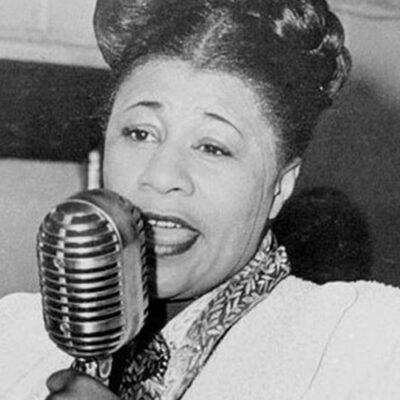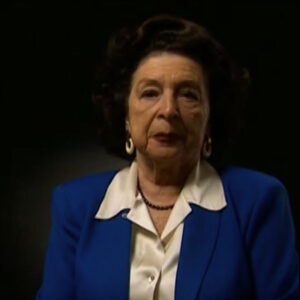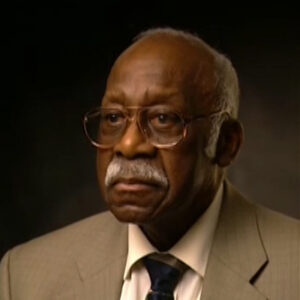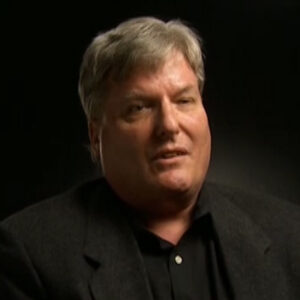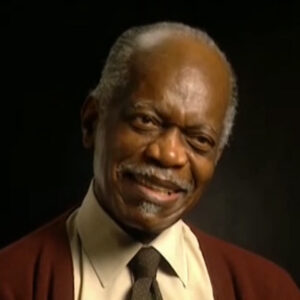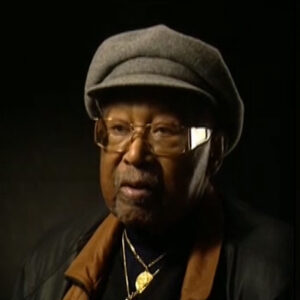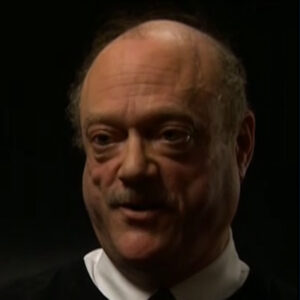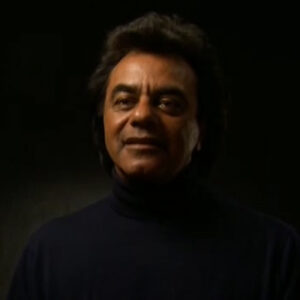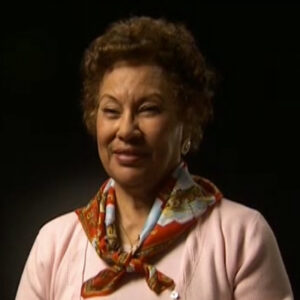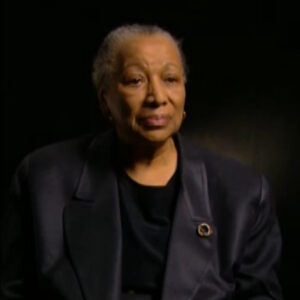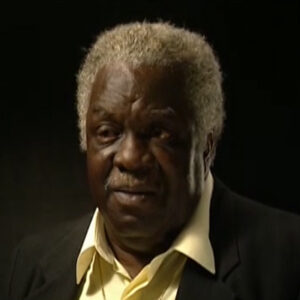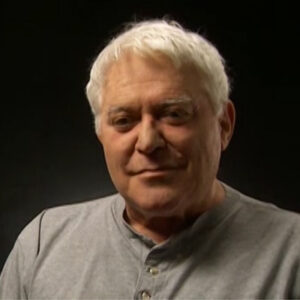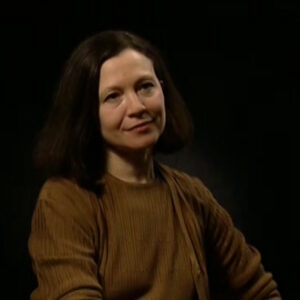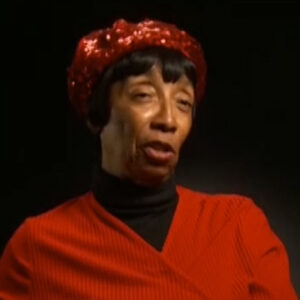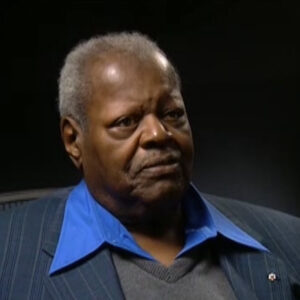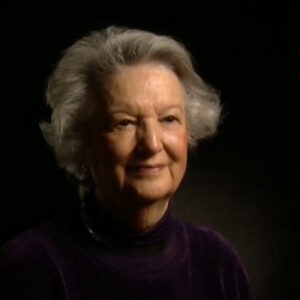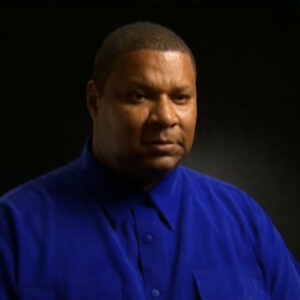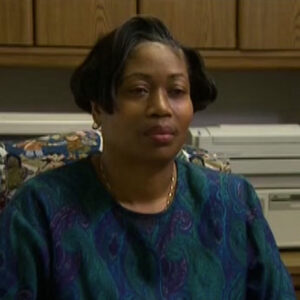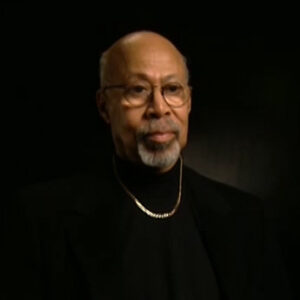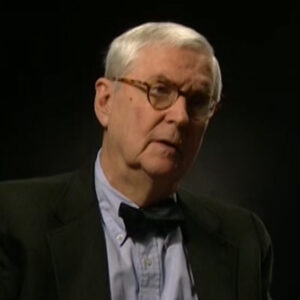Speaker Zero three four four L. And this is Paul.
Speaker I just want to ask you first. What did you know about Allah before you started to do the songbooks? What was your association with?
Speaker I didn’t have any association with her prior to that. I was working in the studios there and I just happened to be working with Buddy Bregman, who was the arranger composer who did her first songbook. So I kind of came along with the package.
Speaker L actually didn’t really want to do this songbooks. We have an interview with her where she said, what is what was Norman doing to me? Uh. Do you know why she was?
Speaker No, I actually wasn’t aware of that, even though I was involved with the. Practically all of them. I didn’t see any, uh. She had to learn so versus that she didn’t know used to come in an hour early. I kind of teach the verses. She was a quick study with those. I think it was the idea of just doing as many tunes as we did. We did not a lot of tunes. She probably didn’t want work that harder than we do 10, 11 tunes and the sergeant, you know, rather than the usual four or five. But you can take almost any take she took and it would be a one.
Speaker But they seem to have it done quickly. In striptease recording studio time, do you think that they were harmed by Martha?
Speaker No, I think.
Speaker Like Buddy Bergman’s case, I mean, any anybody who did Ella’s first commercial album, which was that’s what it was. The songbooks were really commercial for her. I mean, she just saying pretty much straight melody, none of the jazz stuff that she was known for. But there was just doing tune after tune after tune. I think that she might have objected to. I wasn’t aware of it at the time because, I mean, we just came in and did a.
Speaker And you said. They were kind of creeped out. Don’t do it anymore.
Speaker I don’t I don’t know.
Speaker I don’t know what the, uh, you know, the idea, I guess was to get them out as fast as you can. And we had several sessions. But we did many more tunes than she would usually do at a session.
Speaker Why do you think Norman wanted to do this?
Speaker Well, I think it was her first adventure into really doing some commercial music. Up to that time, I mean, she’d been strictly jazz and she was known for her scat singing and Ella really liked to sing ballads.
Speaker In her heart.
Speaker I mean, she didn’t always want to go to school, I did. And she wanted to she said she enjoyed singing pretty melodies like I did. Probably the only album where she was totally featured by herself, singing ballads. Most of the time when she did would do a ballad album, why there were always somebody playing solos behind her. She was like a band singer. And the one we did together, I said, I’m not going to play anything except an intro.
Speaker Get you in. You do a chorus or chorus and a half. And that’s it. No, no, no. But no other soloists turned out to be a pretty good album. Because it’s a tour de force for her vocally.
Speaker Near the end of Madame.
Speaker Why do you think it did turn out to be so good?
Speaker Well, because she’s saying all the songs she’d like to sing. There was no nobody telling her, hey, you should do this or you should do that. She kind of picked her own songs.
Speaker And.
Speaker A lot of them were it were songs that most singers don’t fool with melancholy baby for one, that’s kind of a joke. But I mean, she made a beautiful.
Speaker What? What do you think you did to make it so?
Speaker Stay out of her way. You can only have one solos. I learned about some companies long ago. If you get too busy behind them, why? I mean, you detract from what they’re doing. I mean, then they object in accompanying is the. Assist the singer. Make the background sound as nice and unobtrusive as you can. Regardless of how much you’re capable of playing yourself so.
Speaker They got a nice compliment for Billy Taylor when, as he said, with all the chops you got, he said, I’m amazed at how little you play behind Ella. But that’s the secret of accompanying. And she was very easy to accompany. You always know pretty well where she was going.
Speaker He said at one point she used accompanists dream.
Speaker Yeah, absolutely. She was so easy.
Speaker Let me make it a dream wedding.
Speaker Well, I mean, you you dream of singers, I mean, they don’t give you a lot of problems with rushing and slowing down and changing what what what they did before.
Speaker And, uh. I’d say half of the singers that you play for a little insecure and their insecurity even comes off. They’ll rehearse of one way and then go out and do it. Kylie differently when the red light goes on.
Speaker This year, you decided to take. Normans are free to go on the road with her. Why did you decide to do that?
Speaker Well, because I enjoyed working with her the first time I went out there was 1960.
Speaker I was on staff at NBC over there. I mean, it wasn’t exactly the most thrilling job in life. I mean, musically, shall we say. And I took a leave of absence for six months and went out with her. And I do. And I enjoyed it. I just didn’t want to be out on the road a lot because I have a rather nice family to be around. So the studio thing was much more desirable on a long term basis, where you go home at night and your kids recognize you. They took the family with me when we went, we need to do Europe, whether in 60. I mean I mean, my kids were like five and eight then. And they got to see Paris and Rome and know that at an early age, whether they appreciated it. I don’t know.
Speaker What did they think of Ellen?
Speaker We didn’t have a lot of contact. They just thought she was a nice, nice lady and but they they traveled at a different time.
Speaker I watched my wife had some friends in the chopper over there in Berlin, Berlin, and she and the two kids would go to Berlin and we’d do three or four one nighters. Then we come to Berlin and play. And I’d see them. And then they would go to Paris and we do three three one nighters and then I’d be meet her in Paris four days later. So they really didn’t see a lot of Ella.
Speaker And what were the traveling circumstances like? Well, they were classy all the time.
Speaker I mean, just, you know, we flew most of the time between. That’s less of a 70, 80 miles or something about. They had a bus that we could ride in. And hotels are taking care of the usual good road situation.
Speaker You went at one point to Montevideo?
Speaker Yeah, we did. Well, we did a TV show down in Montevideo historically.
Speaker Can you tell me about that?
Speaker Yeah, well, that was that was the one thing I mentioned that the. Tribute to Ella in New York. They did at Carnegie Hall. Each one of us was supposed to come up with a. Some some kind of a comment. I mean, there’s something that had happened in the mind of a day or thing was probably the Max Senat of all times. Because television was really in its infancy down there that. They met and set the plane and took us out of this giant Quonset hut, which was reasonably well equipped, apparently.
Speaker And we just rehearsed our half hour show that we’re going to do. And they were thrilled because they had got a world famous singer coming in.
Speaker The studio was pretty much all lit up at the time with the sun rather than lights.
Speaker So we rehearsed in the afternoon and they did the old Jimmy Durante bed at the end. Walking away on the check chequerboard with each score lighting up as she would leave the studio and she both the singer way out.
Speaker And that was it, the same way Joe Durante used to.
Speaker Live on his.
Speaker I think probably the funniest thing was the fact that they were also very pompous about it. They all had the white tuxedos on. Immaculate. When they met us at the airport and at the time of the rehearsal and at the time of the show. They counted down American style, nine, eight, seven, six, five there when they got to about three to one. They had one camera, one boom and one light. And when they got to the, uh, about three cameramen stepped back and tripped over the electrical cord to the boom.
Speaker And instead of letting go of the camera, he took the camera with him right over backwards and ended up this way with the camera shooting the ceiling.
Speaker And now we’re on the air and the man with the boom cracked it up and it didn’t work.
Speaker So now we have silence and a picture of the ceiling. Now, see, that’s the opening of whatever they or television.
Speaker And.
Speaker The studio was Dems, although they had one light and the light was a work light. And when he switched that light on, every fly in the studio came around that light. And the end result was developed the most the show like this, what the hand’s going to keep the flies out of her mouth. And naturally, we were hysterical on the side. But luckily, with at the piano, bass and drums, you can play and still laugh. We had Roy Eldridge with us. He couldn’t play a note. Every time he got his horn up, I mean, the tears were running down his face. He couldn’t play. So he was a total loss on that particular thing. And somehow she managed to get through the show, even fighting the flies and everything. And when she came to the very end with the checkerboard, she went to her square, you know, square one like one on square two. She went to two, like one on a square four. And she went off in total darkness. And by that time, William, a week. It’s probably the hardest. I’ve laughed in my life. The tears, which just really tough. Well, that was our adventure with the Uruguayan television.
Speaker What was their reaction?
Speaker I don’t I don’t really reme remember me, but says that this is like thirty nine years ago. But she was she she wasn’t too happy with with the fly search of every everything else, you kind of took in stride. But when you have a whole mass of flies around you and there’s one rotten light and I work late at that.
Speaker Those those were the days of early TV. It’s like all the mistakes you made during live TV. You know, when you only get one shot and if you make a mistake, why?
Speaker I mean, there’s no tape to rerun it on.
Speaker She seems to have been a very good sport about things like.
Speaker Yeah, she didn’t. She didn’t care. Carrie, the weather, as we said, she was just kind of laugh it off and say, well, that’s that’s the way it is. There’s nothing you can do about it.
Speaker Because we have the videotape. She was asked to do some really silly things on television. And. Did it?
Speaker No, she was a good sport. You have no, no, no problem with her cooperating.
Speaker There’s another story that you told me about.
Speaker Some of smoking a cigar.
Speaker Yeah. That was at the Fairmont Hotel. There she was. She came out through the garden and did the first two or three tombs and there was a. The guy sitting in the front row there with a group of people. And he had this big stogie and he started blowing the smoke deliberately up to her. And our drummer at the time of stand leaving, he was the next heavyweight boxer myself on piano and everything. And.
Speaker He, from the sky, kept blowing the smoke up and his wife kept hitting him. Stop doing that. He was having a ball. He thought that was real funny. And finally, the cloud got tours. He was coughing and hacking and she had to go off. And the audience was mumbling, wondering what was going going on there in stand.
Speaker And I had a choice of either going up and wasting the guy or or I had a better idea for it. So I went through the curtain. I just talked to him. The audience got very quiet because they wondered what happened. They only got fifteen minutes of show and it was over.
Speaker And I said, do you realize, sir, that blowing that smoke in her face has caused this audience to be short changed?
Speaker She can’t come back on with all the smoke going on. I said you have ruined the show for all these people. And then I walked back through the. This raw uproar started. You could hear the mumbling. Got it. And they had to call the whole batch of cops and to get him out. And it was like running, running the gauntlet, going back up the aisle.
Speaker Women were hitting him with their purse and guys was trying to swing at them. He had a heck of a time.
Speaker I thought that was much nicer, stabbing me, doing anything drastic.
Speaker Did you ever think that that might have been a race racially motivated?
Speaker I don’t know. And we never worried much about, you know, the racial thing, especially with alcohol.
Speaker Yeah, well, it was pretty much loved by every color you can think of. I just think that the guy was a he was a Chinook, you know, just one of those guys that you have neighbors like that sometimes.
Speaker All right. The.
Speaker Ella Leive is so different from everything else. Do you think that she could really walk out and read an audience?
Speaker No, she. She just came out and, as we say, did her thing and.
Speaker With all the success that she had. I remember one night when I was first weather up at the Fairmont, you know, she was looking. Now she holds every record that the Fairmont ever had.
Speaker They were lined up for, you know, not just outside the room, but clear outside the hotel to get in every show.
Speaker And she was looking up from behind the curtain before the show. And she says, I hope they like me. Which tells you something.
Speaker That she was never, never, never really totally sure. And then as soon as she got out and started singing her bang, everything, everything fell into place. But the few moments before walking on, she was always a little apprehensive.
Speaker She was known to be quite shy.
Speaker Yeah. Yeah, basically she was, yeah.
Speaker She was like a charming little girl, actually. She she didn’t have a whole education behind her and everything. Her singing was an accident to begin with. I mean, she wanted to be a dancer.
Speaker Have you ever heard that story? You probably have heard that. She told you that story, too? Oh, yeah. And we all know that story. What did she tell you?
Speaker Well, they mean she and she and her friend had this little dance routine and they wanted to be dancers. And they won this contest that, I guess, of one of the theaters in Harlem. After the main show was over, they were to go on and have the amateur thing that she was involved with. And the last to act legitimate actor on the stage was a couple of tremendous dancers and she said we can’t go on to do that. And they said, well, you have to go once. She’s a wolf, like we just can’t go on to dance like that. I’ll. I’ll sing a song. Anything to get out of there again. You’d be like a lesser piano having to follow Oscar Peterson, which is just doesn’t work.
Speaker So she went on and sang a couple of the songs that she learned. That was the beginning of a tremendous career. If she gone on a dance floor. I mean, you’d probably have never heard of her. Maybe other than as a dancer.
Speaker Many of faith leaders said that nobody ever wanted to follow our.
Speaker Now, as you said, it was like following Sinatra. Who. Who would ever want to follow Fred? You know, the only guy that could follow Frank gracefully was was the Sammy.
Speaker Anybody ever try to follow Ella?
Speaker No, Ella usually closed the show. I mean, all the acts went on ahead of time.
Speaker I don’t think anybody, at least all the time I was with her. I mean, there was there was never an act that came on after maybe one once before. I mean, there was always a Miren, Myron. And you opened the show once in a while for. Jose Luis corsairs going back a while.
Speaker You usually have a comedian for maybe twenty five minutes, half hour. I mean, in the. Vegas and Miami areas.
Speaker But most of her guys said she just went on and she opened herself. She’d go out there and start to do maybe an hour. And then after the hour, Joe Pass would come out to fifteen minutes of his own. And then she’d work with Joe for a few things. Then we’d come out with the trail and finish up the show.
Speaker He said a little earlier that she was like a little girl.
Speaker What was that like? How how did she.
Speaker Well, that’s that’s that’s also part part of her voice.
Speaker Her voice was always I mean, even up to the very, very end, her voice was pretty pretty much that of a little girl. You know, I mean, it wasn’t the rich tremendously wide by. I brought a voice of a mature woman that was always that kind of a sweet. She always had the sweet, innocent sound, which is what I’m sure made her what she was. And you can relate to her. I mean, it seems she didn’t relate well to people from the standpoint of of maturity. I mean, she I mean, she loved to talk about and music and children mainly. She was very interested in children.
Speaker Did the. Do you think you saw the girl crying? She seemed to have a. A lot of trouble having any long term relationships.
Speaker Yeah, well, I heard him sing. Singing was the big thing with her.
Speaker You know, that’s if you have a career that big, it’s very hard to have any kind. I mean. And she well, I don’t think she was mature enough, really. I mean, to have a what what you what you would call a mature relationship. Because the controversy, the conversations were usually about music or food or I mean, she used to love to watch the soap operas. That was her morning thing. We weren’t allowed to disturb her till after 11 o’clock or whatever the time know, so she could watch. Whatever it is, as the world turns as something.
Speaker But then a lot of people got involved with that, Sam. Sammy Davis got into that. I mean, when he was in the hospital, he he was watching this, I guess, as the world turns, as I think. And he so got hooked into it so much. I mean, he volunteered to do one of the shows form. He wanted to be on the show.
Speaker The.
Speaker And the jazz at the Philharmonic tours, the end of the show is a kind of a.
Speaker Finale. Everybody comes off, yeah. What did you think of that and Ali’s participation?
Speaker I didn’t do a lot of the jazz at the Philharmonic, things I did pretty much just the solo type concerts with L, I think I only get maybe one, one or two. Where were we at the Oscar and Stan Getz and all the top jazz players, you know.
Speaker And as would be typical to have everybody to come on at the end, as well as the elders singing SCAP along with the band and.
Speaker That was just kind of the stock ending of the jazz at the Philharmonic thing. I didn’t do a lot of those, maybe two or three out of all the trips we made. Most of the trips that we made to Europe and Asia and various other places were strictly her concerts. With with her trio, and maybe we would have either Joe pass once a while, Oscar would open the show for us. But hello, I was close, close the show. Most of the jazz at the Philharmonic, things were done, I think, before I joined her. I mean, the. Because I only worked with her, I worked there were there six months in nineteen sixty nine when I went back to the studios. And then I went out with her for forty six weeks in 1962. Stand leaving Wilford Middlebrook’s. At the end of the forty six weeks, Stan and I tore up our tuxedoes. In unison. Because it musically was great, but we actually worked forty six weeks and there was very little time off. You don’t see too much of your family except you come through the general area. So once again, I left and went back to the studio work. Outside of NBC did a lot of the movie stuff and the other television reasonably busy, and the only thing I did with it between 1962 and about nineteen seventy eight, there were the Memorex commercials and recordings when she would come in time to do that. I’d usually get a call to record with her, but I didn’t go on the road with their little seventy-eight.
Speaker Now, the Mavericks commercial. This is an interesting thing that happened to.
Speaker Yeah, of at. And she actually, you know, they had they would work on the glass until they got the glass, which would. Be cohesive or whatever the word is with her, with like with her iji. So when she was saying the Haiji.
Speaker That Tom would would break the glass ceiling and half the glass would break had to be a certain note. Cracked the glass. So it really wasn’t a fake. Oh, it was just that I mean, you have to have certain tonality to break that glass.
Speaker They aim to say you were rehearsing with their one day at her house when something similar happened.
Speaker I don’t really remember he came on, I’ve got a nightmare where I don’t remember a heck of a lot.
Speaker Forty two weeks or forty six weeks on the road. Didn’t seem to bother her.
Speaker No. Well, I was. That was the thing that amazed me because he had me bleated. I mean, I could have stayed on and done another fifteen years with her like that, but.
Speaker I think Tommy Flanagan took over when when I left in 62 and he stayed with her most of the time up to 77. I mean, I think he had a heart attack or something at the end of the 15 years. But I mean, apparently for 15 years she did that same.
Speaker Same type of thing in London. London on Monday, in Paris on Tuesday. Back to Miami on Thursday.
Speaker It was hard work from the standpoint of traveling musically. It was great when you get on the stand. Have a wonderful time. But then you got to get on those planes again and five or eight hours or 10 hours or whatever it is.
Speaker What was the tone? Why was it like that? I mean, you think that normal would mean I have been able to work out a very logical.
Speaker Oh, yeah, I know you had a good. Generally, it would run, you know, from one to the other, but quite, quite often.
Speaker I mean, she would she would have an engagement like in London and then come back over here to do something in Miami or Seattle or something and then go back to London the next week. So there were a few there were a few jumps like that, and the consistency of being on the road, you know, is. If you’re single and adventurous and having a big ball on the road, it’s great, you know? I happen to like being with my family and I want my kids to remember what I look like and have a little say of what’s going on with them.
Speaker Ellie?
Speaker Well, she had the son they had. She and Ray Brown, when they were married, had adopted the boy. Then when they split, split up. I mean, that he didn’t see a lot of tremendous amount of either one of them, you know, with both of them had tremendous careers.
Speaker Did he ever come out and visit?
Speaker Oh, yeah. He was around occasionally. You know, we. We got to know the big boys of us. About my height, about six, five. And he played drums. Uh. I didn’t see a lot, a lot of them. I would see him periodically, maybe once every five, six months or something. We were on. Then he moved up. I think, to Alaska askers, I mean, he was playing up in Seattle, the Alaska area.
Speaker After her divorce, Ray Brown, she. Really?
Speaker Successful relationships accept. At one point, she bought a house in Copenhagen. What was that about?
Speaker I really don’t know. Well, you do you do know. Her friend.
Speaker I know she was she was going with a little guy who was about half her size, you know, used to be kind of a gag that. She had returned over Ignacia, kill him.
Speaker He wasn’t a diva. He was a very small little Danish guy.
Speaker But I kept out of those things come completely in. I mean, I had and I had no real personal, close, real relationship there. When I get through with the job, I go home and then nobody sees me again. I don’t even hang out with the guys. I mean, I just do my thing, wander around.
Speaker So it’s a little you look at the watches and you know that that kind of stuff, and she’ll show up on time to do the next nice job.
Speaker Elmo is known for her extraordinary generosity with their physicians. Did you experience that?
Speaker Yeah. Thanks.
Speaker Especially after she didn’t handle the money at the time that you worked for a norment is a Norm Naaman. To his credit, I mean was as consistent as the sun coming up as far as far as finances and handling business. But after after I heard her death, I mean, I wasn’t even thinking about anything, I got a call from a lawyer and then she had left a pretty good some sum of money to me. And I was amazed, you know. But I. I appreciate that. Absolutely. And about a year later, I got the second installment. Just out of a clear sky. And she had made arrangements, I guess, and knowing that she wasn’t going to make it.
Speaker I haven’t talked to any of the guys like Keiter Betts, who was with her for years and years and years. And Tommy was whether whether, you know, piano for a long time or another. And I imagine she she she probably did the same thing with them, know, for the people that were with there for extended periods of time. You know, I was whether from a body 82 to 90, that was the longest run. I did 78 and 79 were there, and then she no one was getting her too busy on the road. So I left again. Jimmy Rowles came in from eighty and eighty one, and I came back in 82 because Jimmy got sick and they were supposed to find somebody to replace me. I just came in temporarily and then she was only working three months a year, which was ideal for me. So I just stayed up until Nadie, then I left in 1990.
Speaker And when you came back. Her voice said she.
Speaker Yeah, well, she was she was aware of the first thing we did was the thing with Nelson Riddle called Dream Dancing. And I noticed this wobble in her voice. And before I could even say anything. And I went back to here. Let’s listen to one of the takes after week. And she said to me, I call myself Mary McGiver.
Speaker I saw them by Broad, who’s got them pretty wide there. You know?
Speaker Which is partially because of the tremendous strain, you know, for the 15 years of what we did in 1996, 62.
Speaker You know, I mean, night after night after night and doing all the scatting and everything. It’s a tremendous strain on it. No matter how big a talent you have, if you haven’t taken a few voice lessons, learned how to conserve that. Billy Eckstein had the same thing. Billy had lost total control of his vibrato. It got so wide. I mean, that was all he was almost a parody of himself. But that comes from just singing on talent alone and not really studying what what you’re doing. It’s like playing piano with flat fingers. There comes a time where we’re finally the fingers don’t work worth a darn.
Speaker She did develop ways of disguising.
Speaker Yeah, well, I mean, she would move around a lot. I mean, her her problem really was sustaining notes, which was partly because of her heart problems.
Speaker Her breath control wasn’t good, so consequently, I mean, the vibrator would get to the point where it would almost break up. So being able to ad lib.
Speaker I mean, she she would get off the note and sing a couple of extra notes and move things, little bits of. Nobody really would notice except the people who knew were extremely well, you know, musically.
Speaker Once that had happened, and, of course, it got. Much worse. Why do you think all those people were still having the last?
Speaker Well, they did the same thing with their son. So naturally, I mean, Frank’s voice wasn’t exactly the very best at the end either.
Speaker But. Same thing with Judy Garland. You know, Judge Judy wasn’t singing well at the end of her.
Speaker Career.
Speaker Well, this is kind of it’s kind of a hero worship. Stay with him.
Speaker I guess all of us had the same problem. So, you know, people who I mean, they offer Elvis wasn’t doing too great at the end of his tenure either. But I mean.
Speaker They say they still gather around for.
Speaker Appreciate it. And we are zero through five.
Speaker To have her go again, to fail and you actually notice that one day.
Speaker In Washington, I recall, yeah, she had been feeling real, real well and. As a gag, a lot of times when she come down in the morning, you know, I’d reach out like I was going to shake her hands and then run, run my hand. Clear up arrivers. I have a very large hand. And she came down this one morning, you know, and I said, How are you doing there? And I took her hand and ran. And she was ice cold from the rest of the elbow, which means there’s. Nothing going on there. And she’d been complaining about not feeling well, I said, you better have your heart checked. I you mean you you have nothing going on between your elbow and your hand. I said that’s. So she went to a doctor in Washington and they kept her there for two days and then they flew her out to the coast and she had heart surgery.
Speaker So that helped to keep her around for a while. Her not dead. I just know that if you’re ice cold here, there’s no blood flowing in there.
Speaker Shall I just have a pokey’s just pull it back, your jacket down?
Speaker Yeah. Seven, three. Five. Right.
Speaker I’m sorry. Shrinking. So true. She also lost a lot of her eyesight.
Speaker Yeah, well, she she had bad eyes from the time I knew her in the. I don’t know what you know exactly. What it was, it was it was very dim. I mean, know she was blind by any means. But. She didn’t see particularly well.
Speaker How did that and stage.
Speaker Actually, it really didn’t. Her manager used to always make sure that we had bright white markings. If she if she moved around. So long as she didn’t go forward towards the edge of the stage. So they had a big white white strip there that you could definitely she could definitely see.
Speaker When she took her one fall at the Hollywood Bowl with her. I mean, she was looking out at her doctors had told her they were dying. She was looking for them. And they’re looking up here and not looking at that. And she stepped over the white line and fortunately, the pit was up. So, I mean, it was a small fall. That’s when she said her famous line. This is one audience I really felt for, which, of course, the audience for about.
Speaker Did you tell another just this one?
Speaker Could we have speak?
Speaker You mentioned another story with the base of Van.
Speaker Oh, yes, she was standing in front of the sax section and she stepped back and one of the electric cables was there and she tripped and fell, literally sat down in front front of the basic man she was singing and one of the reasonably hot songs. And then with the scatting and everything, two of the saxophone players got up and came around to help her, and she waved them away and just kept kept singing till we got to the end of the tunnel. And then she waved them to come over and pick her up after she finished the song.
Speaker I think it illustrates about.
Speaker Well, a sense of humor. For one thing that she could see. See the humor in the thing, and I believe that it would have been embarrassing. I mean, if she stopped singing.
Speaker For her, there would be a big low level. So she was smart enough, she just kept on singing and it was a scarf thing anyway.
Speaker Well, what did the audience do?
Speaker Oh, they were hilarious. She got the biggest hand of all. Yeah, I mean, even when when they came around, they helped her up and she took her back.
Speaker That’s really charming.
Speaker I have a couple of. Performances where?
Speaker On video where you seem to be guiding her off stage, that becomes something.
Speaker Yeah. And the dark quite, quite often. I mean, unless it was tremendously well, well lit.
Speaker Well, I mean, one by one, one of us, usually me, you know, would just kind of take her arm and get her out as far as the.
Speaker Kroger, the piano. She was a little unsteady on her feet because of the eye thing.
Speaker I know because I have a macular degeneration problem myself. You know, in some cases, sometimes you weave a little bit.
Speaker And especially if it if it’s dark. It was very hard for it for her to. To see her away from the edge of the stage. Out to where my equation.
Speaker Toward towards the end, we used to make sure that Mike was in the crook of the piano, so she had had something to lean on or put her hand out for.
Speaker Kind of steady herself.
Speaker We have window. Very interesting take that you’re on. President of Pittsburgh, where she.
Speaker Very easily about herself. And she’s known to hate. Now, I think probably Carl Andre made her feel very much at home.
Speaker Anger is very, very good at that. I mean, he loves erbium, I mean. As most of us there do. And she she felt very comfortable talking, talking to everyone. I mean, knowing that he was a complete admirer, you know what I mean? They did some things together. On this show, which were charming when he played for. But if she if if she felt at ease, why she would talk about things generally that she wouldn’t on a more commercial or stiff interview. Be a little more reticent to. Open up.
Speaker She was very, very. But a lot of. To talk about at times, yeah.
Speaker If they got too insistent. Which the press can do.
Speaker Makes makes me think of Jesse Ventura’s opening line. When they said to him, now that you’re in politics, I mean, what are the things you don’t like about it? He said the press.
Speaker I’d vote for him any day of the week.
Speaker But they would be of the paparazzi, especially in Italy and France, all out over there. You know, I mean, they would just be overwhelming sometimes. I mean, with a camera shoved in your face. And I mean, that’s why I say it’s it’s it’s wonderful not to be in that position. I can get off the plane and go get in the cab, go right to the hotel. No problem. But it was usually they would have a press conference at an airport or she just got off the plane, go into her room at the airport, and all these people are there, you know? And if she was tired, I mean, and sometimes she get a little irritable because she wanted to get it over with and go to her hotel and rescue. She has to work that night.
Speaker Who would have been the. Who could fixed that for her so she wouldn’t have to do that?
Speaker Well, look, it was a two edged sword. It’s a situation put Norman in kind of a bind because, for instance, she would she would say, you know, I’ve been working so hard. I know.
Speaker I know I need some time off. So he give her about three or four days.
Speaker And at the end of the third day, she said, doesn’t anybody want to book me? Harvard has just been trying to be nice and Jeffrey, give us some time off. So he was damned if he did. That would be dead.
Speaker She. When you. Well, first, why did you leave? Why did you decide to leave?
Speaker Well, I left three times. I mean, the first one was after the forty six weeks where I really wanted to be with the family and I really didn’t want to go out and do another forty six weeks on the way.
Speaker Then in seventy eight I came back. I worked seventy eight. Seventy nine. And again, it was a little long, I was away from home an awful lot.
Speaker And so at the end of seventy nine, I left again. That’s where Jimmy Wales came in. And in 1882, Jimmy got sick. So they called me and asked me if I come back until they could find somebody and said, fine, you know. And then my came came back and the first two or three, three weeks were I think we worked a couple of one nighters and that was that was it. And Norman said, now I’ve cut his schedule down, you know, but it’s about three months a year. I said, under those circumstances, I can stay. So I stayed that way. That’s that was the longest run I had was from about the middle of 82 until 1990. And in 1990, I mean, she was just working Spazz. That was the beginning of the problems with losing a finger and toe in all this kind of stuff.
Speaker She was only working. They would call you at the last minute for a date and I’d already have another day. And a couple of times I had to send a sub, you know, I sent a competent sub who did. But it’s the idea that I wasn’t there. You know, so enormous is I going to get somebody, you know, that that can be there. I said, I understand that perfectly. It just, you know. I can’t cancel out all the other stuff I’m doing, you know, I mean, to go out for one night on a specific night when I already have committed myself to somebody else.
Speaker I can’t say, oh, I got to go with L.A. So I left the night. I think Mike Warford took over farm. He was a good good thing. Ramsey Leben san. San Diego Yunos. He could fly out and still work in San Diego. Santa Subin his job there. He was doing some studio work. Good player.
Speaker And I think he finished out the thing until she finally just stop. Stop working.
Speaker When I left, she was right and that was the first in India indication of the diabetes thing. She had an infected toe.
Speaker And I went to visit her at the hospital, you know, and she said, you want to see my toe? And I said, Sure. I’ve saved a lot of it. Ya. So she took this little white thing off her toe and your toe was like greenish black, you know.
Speaker And my personal opinion was it should have been taken right then and there. But for six weeks they kept her in a. In the hospital, a lot of money and gave her antibiotics and all kinds of things, ostensibly to to straighten out the tell, which from what I’ve seen of that kind of thing, I mean, there is no straightening out or something like that. That has to go. Then they took the dye and then gradually she lost some more limbs.
Speaker I didn’t see her. After after 1990, she really she became a little bit of a recluse, you know, which makes sense. I kept in touch with Mary Jane out of water. Her secretary called her about every two or three weeks. How’s Ella doing? Give her my love.
Speaker But she didn’t want a lot of visitors to come up there. Do you think that she. Saying too long.
Speaker I think she worked too long. That was the whole thing. Not so much to see, you know. I mean.
Speaker Although she wasn’t really singing that much the last, you know, the last eight years or so from 82 to 90 that I did, whether she an awful lot of time off. You know, there wasn’t. It wasn’t that constant pressure. I think all the all the damage to her voice and everything else was done.
Speaker I think the being in the spotlight that much probably didn’t help her rise either because they have some tremendous lights.
Speaker There was just kind of a general general deterioration.
Speaker I think, I mean, she was a diabetic and it just kind of got to her. Finally.
Speaker Did you have.
Speaker You said you kept in touch with Mary Jane. Yeah. How did you actually hear about Ellen’s death?
Speaker I think I read it in the paper, you know. She died one day, he was in the paper the next day. I called Mary Jane and talked to her briefly.
Speaker Did you go to the.
Speaker No. I was out of town.
Speaker Unfortunately, working or fortunately working, whichever way you want to look at it, does favor your favorite songs that you did.
Speaker Well, had a lot of I mean, everything she said was great. Angel Eyes was one that was I was one we did on the album, too. Matt Matt Dennis’s song.
Speaker I really. I really don’t have too many favorite songs. I’ve just discovered one of my old Denovo, Michelle Grand, wrote called.
Speaker How Do You Keep the music playing? Which turns out to be, I think, probably my most favorite song right at the moment. But after that time, I really haven’t had one particular favorite song from anybody for about a year.
Speaker Because almost everything that she did was class class A right down the line kind of spoils you for other singers, you know.
Speaker It was something that I was always looking for that hit. And wanting to stay. My.
Speaker Well, only only if it was musical.
Speaker She never got into the rock thing, really. You know, she never wanted.
Speaker Record. Hey, we mean she do the blues and things that were close to it, but I mean, she never really got into rock, per say.
Speaker But she would do things like the muffin man. Mm hmm. Never, ever just get it dusted. Yeah.
Speaker But those you know, those those those are cute little song. Yeah. No, I mean, you can’t you can’t really categorize them. I mean, that’s good cause that’s because that was the first song she wrote like she and Van Alexander did that.
Speaker What do you think that the audience just insisted. You got to sing song.
Speaker Well, when when you have a hit that big, that and Mack the Knife, she had to do Mack the Knife.
Speaker You know, I mean I mean, as soon as we start the intro on Mack the Knife, I mean, the applause would start because everybody knew what what was coming.
Speaker But when you do it every night, seven nights a week, for 15 years or so, you know, there are times you to say, I hate to do. That’s all I get. But then she’d get out and really get into it.
Speaker I heard a tape table concert, nineteen eighty nine in Florida. And it’s just like you just said, you hear the intro and the audience goes crazy. Yeah. Let’s play in her career where she stopped. Yeah. Not long after that. Right. When did she stop by?
Speaker About ninety two. I think it was about two years. And I think that Mike Walker worked with her. I mean that she was doing. Maybe one day a month or so.
Speaker And then.
Speaker What do you think is the legacy. Ellen wanted to leave us with?
Speaker A lot of beautiful singing. That would be it. You know, I mean, there’s. She was one of a kind. I mean, this. There’s nobody like her coming up. There wasn’t anybody like her before.
Speaker In fact, she was part of an era which kind of ended when Frank died.
Speaker You know, Sammy Davis is the elephant. Terrible. The Pearl Bailey. Frank, you know, the now Joe Ward, Joe Williams, bless his heart. You know, the era of good singers. You know, my own personal opinion is today we have a lot of people who just shout. There are very few singers left yet. I mean, of of the type that would represent what Ella and Sammy and those Peepee people did. You know, you have Jack Jones and maybe Steve Lawrence, Tony Bennett and Victor Vaughn. And that’s about it. And probably only one of my Tonys, probably only one with a record contract.
Speaker I think we’ll see another.
Speaker I don’t think so. I really don’t.
Speaker I mean, not not not for a long time, because the level of appreciation by the public is so low now.
Speaker You know, I mean that the.
Speaker There are a few, there’s a few. There’s a singer named Marilyn Mae, who is a great singer, and she’s always been relegated to singing in Kansas City in the Missouri area.
Speaker Once in a while, she gets out of there. You know, she’s still good. And that’s the problem with a lot of the singers to today that you don’t hear about. You know, these guys I mentioned to two. Good. You know, it’s a corn country, Western is fine, you know, but you’re not talking about singers, you’re talking about people telling their little stories. They are not singers. You know, there’s no real warmth, there’s no real training in the voice.
Speaker Why, what we see?
Speaker Well, it’s unusual, it’s like seeing another buddy rich. Anybody can do other things Buddy did on drums. I mean, there hasn’t been. I mean, Louis Burleson’s of the closest Luján buddy, where they are probably the two top ones, you know, of complete mastery of the instrument. It’s it’s like we haven’t had a pianist that could come near Art. Art Tatum yet. All of us try to imitate him and listen to him and maybe do so few of the things he does. You know, Oscar is probably pretty close to him, but I’m sure I could be the first to admit that. I mean, Tatum was one of a kind. Ella was one of a kind.
Speaker What would you call that era?
Speaker I know the year of good music. Okay.
Speaker All right. Well, I think that’s why we’re here for. To know no before you do that. Right.
Speaker I’m sorry. You have any additions? Let’s look at the show. So you used a great year in the Morning Star.
Speaker Mm hmm.
Speaker What do me, Greta, and tell me that story again, did you read her take?
Speaker Oh, about the. Yeah. OK. Now, when she came downstairs one morning in Washington, I used to because I have a big hand, but I would sometimes shake hands with her and run my have halfway upper arm. It’s kind of a joke. And this one morning this came down, she’d been complaining of not feeling well and I took her hand and I slid my hand up and she was ice cold from from the rest of the elbow, having not felt good. I felt that might be indicating something if she’s ice cold there. She has no circulation. So I told her, I said, you’re ice cold from there. You better see a doc real quick. And she went to see a doctor in Washington and they put her in hospital for two days, kind of stabilized. And then she flew back to the coast and had heart surgery. So hopefully because we caught it in time, you know, at that particular time.
Speaker You get that straightened out in early 30s. And we’re waiting for a miracle. OK. What was wrong with time? Oh, OK.
Speaker OK. Thank you. Thanks so much. Why don’t you start there and pan out? OK, OK.

